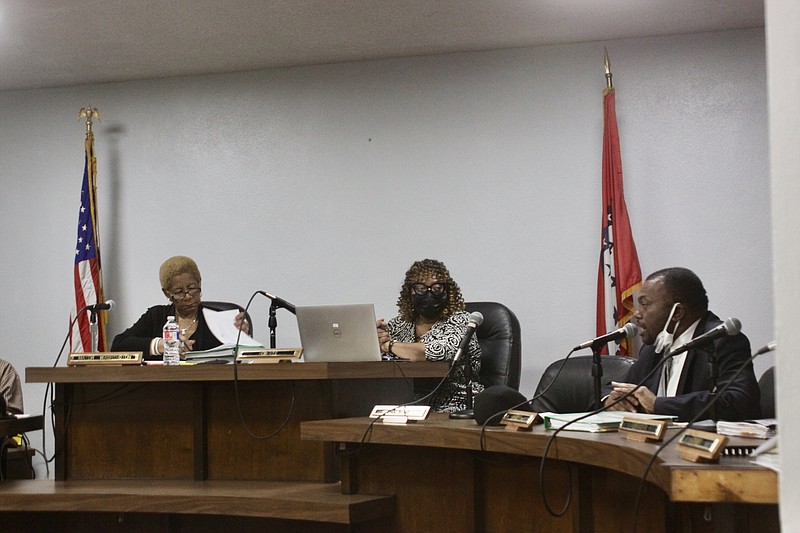After two months of budget hearings and budget adjustments, the city of Pine Bluff's 2022 budget was approved during a special City Council meeting Thursday afternoon.
With the Feb. 1 deadline quickly approaching, City Council members agreed with the last-minute changes and recommendations that were suggested the day before in a Ways and Means Committee meeting.
During the committee meeting, a schedule of revenue and budget changes was presented. Revenue changes included an increased use of Saracen Casino revenue from $3,113,136 to $3,625,238; $115,000 from a library settlement; and $327,748 in FEMA reimbursements.
Some of the expenses included adding a procurement administrator and the raises for nonuniformed employees totaling $623,633. The raises would come from casino revenue, according to officials.
The Pine Bluff police and fire departments would also receive raises by eliminating some of their empty slots. The Fire Department would eliminate 10 firefighter positions to increase their base pay by 10%, and the Police Department would eliminate 15 positions to increase the base pay by 15%.
A balance of $144,081 was left over in the Fire Department after cutting 10 slots. Council Member Joni Alexander requested that money be used to retain two of the Fire Department's positions. The request was approved.
Council Member Glen Brown Jr. said he didn't see the need for a procurement administrator, which was budgeted for $61,109, stating the city had one five years ago and that the person basically purchased paper and pencils.
Pine Bluff Mayor Shirley Washington said the position would be in charge of the mass purchases.
"With grant dollars, we were purchasing all over the place and we are struggling to stay within those procurement guidelines," said Washington, who expects approximately $20 million in Coronavirus Aid, Relief, and Economic Security (CARES) Act and American Rescue Act funds. "Since we're not where we were five years ago, we are seeing the need for that person."
Washington said she would pull the position for now and monitor the need closely through the year.
Council Member Bruce Lockett said he wanted the committee and Washington to consider the recommendations of the financial advisers brought on by the city, William Moss and George Stepps.
They recommended more than $500,000 be cut from the budget. Most of their recommended cuts came from office expenses, technology services, gas, oil and lubricants.
Their concern was the city was too dependent on casino funds.
They also recommended the "2017 Sales Tax Fund" carryover amount of $6,030,000 be used to pay off all direct borrowing and that the council has the authority to appropriate amounts in the "2017 Sales Tax Fund" at their discretion.
One administrator, however, disagreed with the cuts to the budget.
"I looked at those recommendations and went department by department and in most cases what I found is a lot of departments wouldn't be able to function without these expenses that they are recommending that we cut," said Gina Devers, acting finance director and city auditor. "Just looking at the overall number looks great, but when you get into what it actually pays for, we wouldn't make it through the year."
Devers said the January sales tax had increased.
Sales taxes, in general, have been increasing over the years, officials said, but the raises for nonuniformed employees would still come from casino revenue.
Brown was concerned with the city being dependent on revenue from the casino to fund raises for nonuniformed employees.
"We have to be careful paying raises with casino revenue," he said. "If we cannot cut things from inside our budget that's going to pay for this, it's a bad idea because that money is not guaranteed."
Council Member Ivan Whitfield felt the solution to the financial woes was in using the 2017 sales tax for the needs of the city.
"We're sitting here looking for savings and cuts," said Whitfield. "When it came to 2017 sales tax, it was general use tax and if there is a need there we ought to address the need."
Brown said the money was tied up in projects -- some that were not completed due to weather or covid and others that were in the middle of contracts.
The sales tax passed in 2017 is earmarked for Go Forward Pine Bluff, although several council members have eyed the money as a way to ease some of the city's financial woes.
Lockett made a motion during Wednesday's Ways and Means meeting to move the 2017 Sales Tax Fund carryover money of more than $6 million to a designated line item that can still be used for the downtown district projects, developments and for general purposes.
The motion was approved and those changes were reflected in the changes by Washington during the special City Council meeting.
"They can still use it for the purpose it was intended," said Lockett, who said funds would be released as projects came.
Lockett also suggested that if the city's can't cut the $500,000 suggested by the consultants, the city should try to cut at least $200,000.
Washington said she would go through the budget with the finance committee and identify where those cuts could come from.
Washington presented those changes during the council meeting.
Those cuts included:
- $51,525 budget adjustment from the Building and Maintenance Department.
- $4,010 budget adjustment from the Police Department in gas, oil and lubricants.
- $6,488 budget adjustment from the Fire Department for radio maintenance and office equipment.
- $10,500 budget adjustment from the cemetery fund.
- $2,490 budget adjustment from the Inspection Department.
- $1,500 budget adjustment from Animal Control for gas, oil and lubricants.
- $9,000 budget adjustment from the Code Enforcement office for technology.
Parks and Recreation's budget for utilities and repairs of $60,500 was eliminated, as was the Aquatics Center budget of $5,000 for utilities repairs.
Washington also removed the procurement administrator position; in all, there were budget cuts totaling $212,122.
